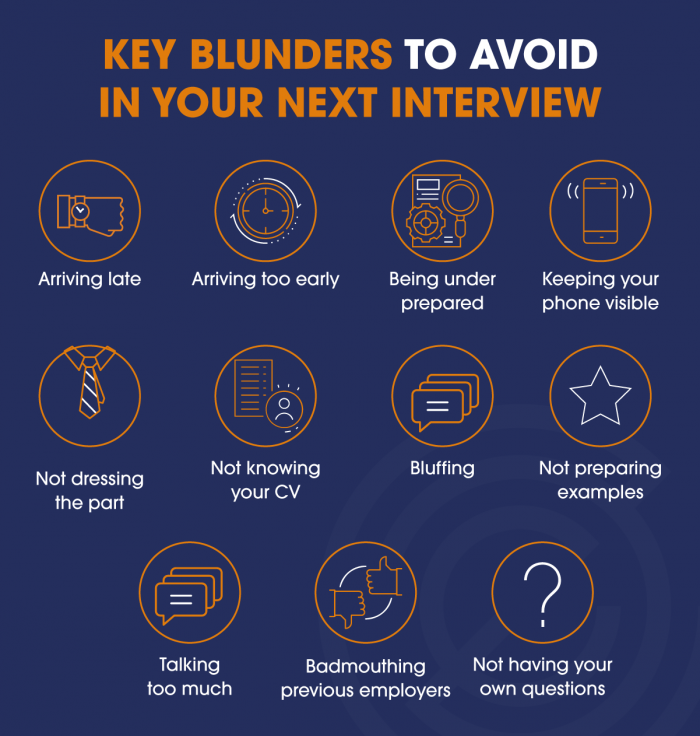11 Common Job Interview Mistakes (and Tips for Avoiding Them)
The interview is a key hurdle in the recruitment process and an important chance to make a good impression on your potential new employer. However, this is also one of the stages that most often trips candidates up.
Don’t spoil your chances of landing that dream job – here’s our best interview advice on avoiding some of the most common interview mistakes so you can head into the process feeling confident and ready to shine.

1. Arriving Late
This may sound obvious, but not many things are going to make a worse impression than arriving late to your interview. It implies that you consider your time more valuable than your potential new employers, that you don’t take the process seriously or that you’re disorganised. None of these options are good! If you’re prone to running late, set your calendar appointment 15 minutes earlier – that way you’ll have time to find the office and mentally prepare yourself before you start.
2. Arriving Too Early
On the other hand, showing up much too early can be nearly as bad as being late, as it can annoy employers when they get a call from reception 20 minutes before the interview, particularly if they are busy with another appointment.
Our advice is that if you do arrive extra early, instead of going to reception right away, take the time to compose yourself, grab a drink of water or go for a short walk. The sweet spot is to turn up about five minutes beforehand!
3. Being Underprepared
Some quick and easy wins when interviewing for a position include knowing about the company, the person you’re meeting with and the role you’re applying for. It’s safe to expect that the interview might start with a question such as “Why do you want to work for us?” or “What do you think you can bring to the team?”, so it pays to be ready with a response.
On the day of your interview, do a final read-through of the company website and social media accounts. See if there are any recent media announcements or important initiatives launched and work that research into your answers. This will get you off to a great start and impress your interviewers.
4. Keeping Your Phone Visible
This interview should be your absolute priority and there are very few situations where someone can’t be away from their phone for an hour. We’re talking about a partner in labour or a family member with a medical emergency. If that’s your situation, explain it to the hiring manager in advance and perhaps reschedule the interview for a time when you can focus better. Otherwise, keep your phone in your bag or pocket and completely out of sight. Even having your phone on the table can be distracting to both you and the interviewer, and show a lack of respect for the process and the people meeting with you.
And don’t forget to set your phone to silent mode (or better yet, turn it off altogether) – it sounds obvious, but you’d be surprised how often we see interviews disrupted by an untimely call!
5. Not Dressing the Part
There’s an old saying – dress for the job you want, not the job you have. This is all about presenting yourself in a way that makes prospective employers take you seriously for more senior positions. If you’re applying for a job in a casual work environment, you don’t necessarily need to suit up for an interview. Just try to look your most professional and polished, with neatly presented clothes and tidy grooming that shows the interviewer you’re taking this process seriously.
6. Not Knowing Your CV
It can be difficult to remember all of your achievements throughout your career, so it’s worth having a brush up before you meet your prospective employers. If you really want to emphasise a shining example of a digital transformation project you worked on or a KPI you smashed, try to rehearse a mini case study with key facts included. It’s also worth reviewing your technical skills, along with the job description, so you can connect your tech expertise with the requirements for the role.
You can even bring a copy of your resume along to the interview so you’re working off the same document as they are – just don’t use it as a script.
7. Bluffing
Another common interview faux pas is trying to bluff your way through a response when you either haven’t understood the question or simply don’t know how to answer. If you’re ever not sure of what’s being asked, it’s always better to request that the interviewer repeat the question, or say it back to them in your own words to ensure you’ve fully understood it.
Take a few seconds to formulate your answer and be careful to respond to the entire question. Breaking it down can often help! And if you really don’t know how to respond, say so – honesty is better than being caught in a bluff.
8. Not Preparing Examples
One of the most important parts of your interview preparation is gathering specific examples to support your answers. This adds weight and authority to what you’re saying, and is a crucial opportunity to showcase your skills, achievements and professional growth.
Prior to the interview, take some time to reflect on your work history and come up with several scenarios that can be used to support various answers – that way, you’ll have something on hand when you need it.
9. Talking Too Much
It’s great to show your personality and engage with your interviewer, but it’s also important to provide short, succinct answers to their questions. Many interviewers will be marking you against a set criterion and the ideal scenario is to tick all the boxes for each question, without going on a tangent or over-explaining your examples.
Remember, if you aren’t clear on the question, you can ask for it to be repeated and even jot down a couple of key elements if it’s a multi-part question. This way, you can refer back to the key areas they want to know about and avoid waffling on about irrelevant information.
10. Badmouthing Previous Employers
No matter how you left things with your prior employer, it’s never a good look to say anything negative about them. This isn’t an opportunity to get things off your chest. Regardless of the situation, you risk coming across as someone who is difficult to work with – even if you were completely in the right. Instead, try to remain respectful when you speak about previous colleagues and find the positives in what you learned from the role.
11. Not Having Your Own Questions Ready
Finally, it’s always best to have a few questions of your own prepared for the end of the interview. However, take care that you don’t ask obvious questions or enquire about things the interviewer has already covered during the conversation, as this can make it seem as though you have not been paying attention.
Your best bet is to ask specific questions about the intricacies of the role or company – this helps to show that you’re genuinely interested in the role and are taking the opportunity seriously.
Summary
These a just some of the common interview mistakes we see candidates make. If you want to be as prepared as you can be and ensure you’re in the best possible position to secure a job offer, we can help.
Here at Emanate Technology, we are tech recruitment specialists with offices across Australia. We know your industry and your local market. To learn more top tips for job interviews and how to correct mistakes, get in touch with our team today.






